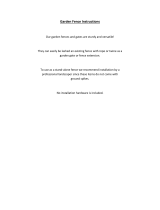
Vinyl is a non-porous material; therefore, paint doesn’t adhere to it well. Only epoxy-based paint
will stick to vinyl over an extended period of time. But paint can damage the vinyl’s surface and
thus voids the warranty.
Is vinyl graffiti-proof?
Although not classified as graffiti-proof, the non-porous surface makes it difficult for graffiti to
adhere to vinyl. Most paint can be removed with ease using a mild detergent and water. For
stubborn stains, you may want to use a pressure washer or paint thinner.
Does vinyl fencing resist mold and mildew?
Vinyl fencing is smooth and non-porous, which makes it difficult for mildew to grow. Mildew will
form only under the wettest conditions, but is easily removed with water and a mild detergent.
How does the price of vinyl compare to that of wood?
Over time, the price of vinyl compares favorably with wood. Through the years, the cost to
maintain a wood fence adds up. Vinyl is virtually maintenance-free, so you won’t spend time and
money painting, staining, or repairing a vinyl fence.
Installation
Does the installation of vinyl differ from that of wood fencing?
Vinyl fencing installs much like a wood panel, but we recommend that you install one fence
section as each post hole is dug, prepared, and filled with concrete. Refer to the installation
instructions for more information.
Should I fill my vinyl fence posts with cement?
You do not need to fill your vinyl fence posts with cement in most applications. If you live in an
area with high winds or extreme weather, it is good practice to cement all your posts for added
stability.
Care and Cleaning
What kind of care and maintenance does vinyl require?
Vinyl is virtually maintenance-free. There’s no need to scrape, paint, or stain a vinyl fence. As
with most exterior products, our fence may become dirty when exposed to the elements.
Pressure washing with a mild detergent and water should keep your vinyl fence looking new. For
stubborn stains, use a non-abrasive cleanser and a soft-bristled brush.















